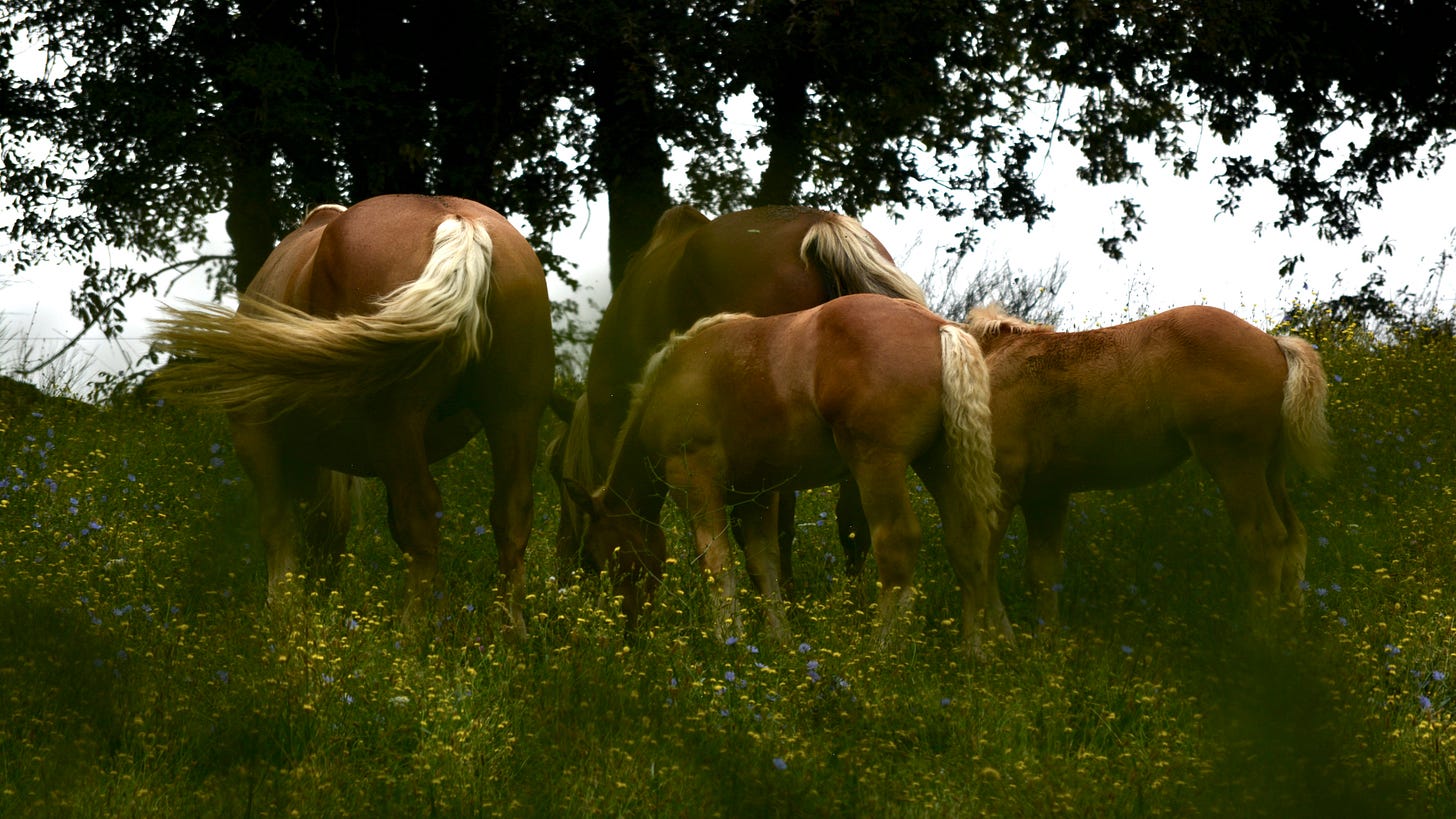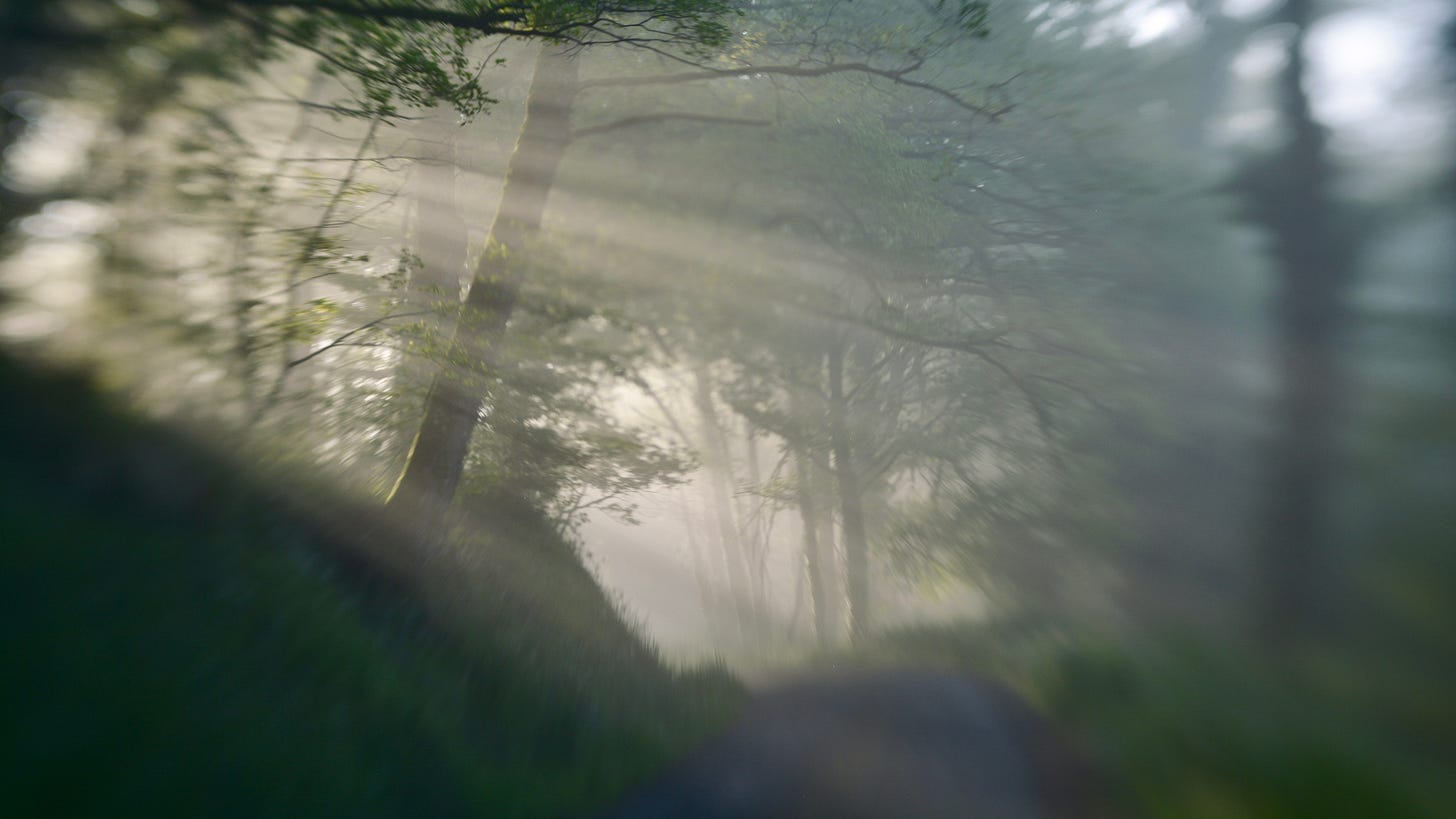Travellers return...
Birds and beasts - They're back and they're beautiful!
Hello wonderful readers, I am delighted you’re here once again, thank you. This week I return with my usual journal of seasonal hill happenings… there is so much bursting and exploding going on out there!
Being back in classes has been an uncharacteristically enthusiastic reuniting of colleagues and students, as if we have all returned from long and beautiful travels. Indeed many have, recounting visits to Mediterranean beaches, Pyrenean mountain’s, even the hustle and bustle of Paris streets. I, however, rather let everyone down, the furthest I journeyed was to Capdenac train station, my story was not perhaps suitable for gentle ears and so I spoke of the hill in glorious spring and abundant wild flowers and leaves bursting and sweet birdsong and bees and butterflies. My excitement was not reflected in any one of their faces, a flash of heartfelt longing for my little angel escapes in a sigh… he would have so got it!
It is of constant concern to me that our young know so little of the extraordinary happenings outside of the four walls of their homes. That they cannot put a name to the sound of crickets singing in the meadows, that they don’t know the names of each tree they pass. Though my time with any one of them is insufficient to teach even a tiniest fraction of the wonders they are missing I will never, ever stop trying, I will never shut-up!
On the second to last day of April a parcel was delivered…
Inside was a book from a fellow France dweller and beautiful Substack writer, . After listening to her read the long and captivating poem, the contents of the book, and then reading that it was written for a project;
Way back in the first decade of this millennium I was commissioned by Devon Arts in Schools project to write a long Dartmoor poem that could be understood by primary school children, appreciated by teenagers, and performed to an adult audience.
I chose to follow the course of a river from Cranmere Pool, from where 5 of Devon’s rivers rise, on the bleak heights of Dartmoor to the sea.
I knew I had to have a copy, not simply for my own joy—and it is an outstandingly beautiful joy from the very first page—I suddenly had an idea that perhaps I could begin a project for the children of the schools in my own area. In other words, find a different, more enticing way of teaching children lacking in knowledge of their surroundings and nature’s wonders, how it can be enjoyed, written about, photographed, painted… Let them know I meant every word of ‘I will not shut-up’.
Roselle, thank you so very much. xx

The Percherons are back!
I greet these giant, gentle beauties with a tenderness possibly reserved—though they do not know this—only for them, look into their beguiling, long-lashed eyes with a mixture of love and sadness; they are the nameless—though they come when I call—honey coloured wondrous equestrian gods that appear on the hill from the beginning of spring onwards to the colder months. Here, amongst the abundance and wilderness of some of natures most voluptuous moments they will remain—oblivious of their impending plight—feeding their vast bodies lush meadow grasses and wild flowers until they have courted, bred and produced their dear foals. When winter months arrive with insufficient fodder left in the pastures, when they are fattened and beautiful, with glossy coats glinting, when the first frost can be seen dusting the hill, in the time it takes for me to walk one last time to their meadows, stroke their velvet noses, feel their soft breath on my face , say the words ‘you were beautiful, you will be missed’ they will disappear. Not all will return.
This year a mighty stallion is marking his place on the hill. He is handsome, protective of his mares, wary of me as I walk the lane. He is not a creature who’s wishes I will ignore, neither, for the moment is he approachable. He has spoken, clearly and precisely. I understand. I am patient. I must be to win his confidence in my presence.
Alvin Sanders, author of A History of the Percheron Horse (©1917) describes the family of men who developed this race of horse and why the breed is so compliant in these words:
“Their horses are a part of their inheritance, particularly prized and accustomed to the affectionate attention of the entire household. Their docility, growing out of their intimate human relationship, is therefore an inborn trait“.
Briefly - At a gathering of like minded souls I quietly disagree with a friend during a conversation about our respective, very different gardens. That I speak of the weather often is, he says, a conspicuous revealing of my lack of interest and knowledge in all that is natural. I do not argue, I do not tell him, either, that the weather decides my every day, most of nature too, that it comes within the same parcel of astonishing beauty as the hare with dampened fur from dew covered grass, the wild rose, petals trembling on a soft scented breeze, the rainbow trout in a fast flowing river. I hope only, as I excuse myself, my tears go unseen.
Under a blue, blue cloudless sky, on a day whispering of May but not yet shouting, I watch from within the four walls of my home as yet more, achingly missed, travellers return to the hedgerows and trees; more especially the Tilleul already in full shady leaf, flowers budding, outside my kitchen door. These, the longed for winged cherubs that fly south for winter that defy the most elaborately technological machines in the efficiency of energy they use to do so; swallows and swifts, cuckoo, golden oriole, blackcap, chiffchaff… all who serenade me through the dusty heat of balmy summer days and breathless nights, have returned to sing their sweet little heads off.
Oh these beautiful—long—nightingale nights…
I cannot decide if the lane I am walking is rain drenched or sun soaked, either way it is crowded with flowers this morning and thousands of caterpillars slipped from their oak leaf moorings during last nights storm. I try not to step on tiny green bodies while wondering about the importance of their number in the evolution of all things, then, how much damage they might cause to the oak trees from whence they came had they not fallen. I deduce only that nature has reason for everything.
There are many tiny, high-pitched voices leaking from hidden places in the shrubs that line the hill.
The Ash trees are slow to wake, slower than I have ever noticed before to unfurl their leaves. They have waited for the Hawthorne flowers, the Walnut—always the last—even for the elder to uncurl their evocative fresh scented flowers before finally, the first black bud bursts into feathery fronds. It is a strangeness that I have no answer for but hold with much concern.1
It is amazing how quickly one can recover from the feeling of betrayal from a differing of opinion and then slide immediately back again when realising their estimation was perhaps not so wrong?
Some birds are not meant to be caged, that's all. —Stephen King
With never ending astonishment of cycling seasons and love always
They are showing no signs of the horrible Ash dieback, or chalarose, sweeping much of Europe, to my knowledge so far it has not reached this far south.








"... a conspicuous revealing of my lack of interest and knowledge in all that is natural..."??
I am stunned!
Has this friend ever taken a look at nature through your perceptive unique lens? Read your lines such as this one: 'Oh these beautiful—long—nightingale nights…'?
Thank you so much for sharing another beautiful walk through le Paradis 💗🙏
Ah Susie, what heartbreak, what delight, what utter, profound beauty you write. And, what utter piffle - "a conspicuous revealing of a lack of interest and knowledge in all that is natural" indeed. Without any knowing of your 'friend', I would respond that they reveal a conspicuous lack of interest and knowledge in our dear Susie, who breaks and remakes our hearts with her delight and deep understanding and love for all that is natural. Another most beautiful letter, Susie. Much love xx